TechRadar Verdict
It's short on features and needs work in many areas, but Atlas VPN's free plan scores where it matters, with a good dollop of data allowance, decent speeds, and a surprise unblocking success.
Pros
- +
10GB/month data
- +
Fast for a free VPN
- +
Unblocks Disney Plus
- +
Rapid email support
Cons
- -
Only three locations
- -
Few features
- -
Small privacy concerns
- -
Some usability issues
Why you can trust TechRadar
Atlas VPN is a capable provider with an interesting free VPN plan which outperforms many of the larger services.
As with most free VPNs, there's a bandwidth limit, but it's generous at 10GB a month (or an amazing 2GB a day for Mac users).
You're limited to three locations: Netherlands, Los Angeles and New York. That's better than Hotspot Shield's US-only plan, but it can't match Windscribe's 14 locations in 11 countries.
A decent set of apps is on hand for Windows, Mac, Android and iOS. The free version limits you to two simultaneous connections, though, so you may not be able to use the VPN on all your hardware at once.
- Want to try Atlas VPN Free? Check out the website here
Although the free plan leaves out a handful of app features – auto-connect, the tracker blocker and data breach monitor – Atlas VPN hasn't crippled the service by leaving out anything major. You still get the kill switch, for instance, WireGuard support, and P2P available on every server. This feels like a free service you really could use long-term.
If you're new to the Atlas VPN name, it's worth knowing that the service is now owned by Nord Security, the company behind NordVPN. That doesn't mean it's a NordVPN clone; the providers work independently, and use their own technology.
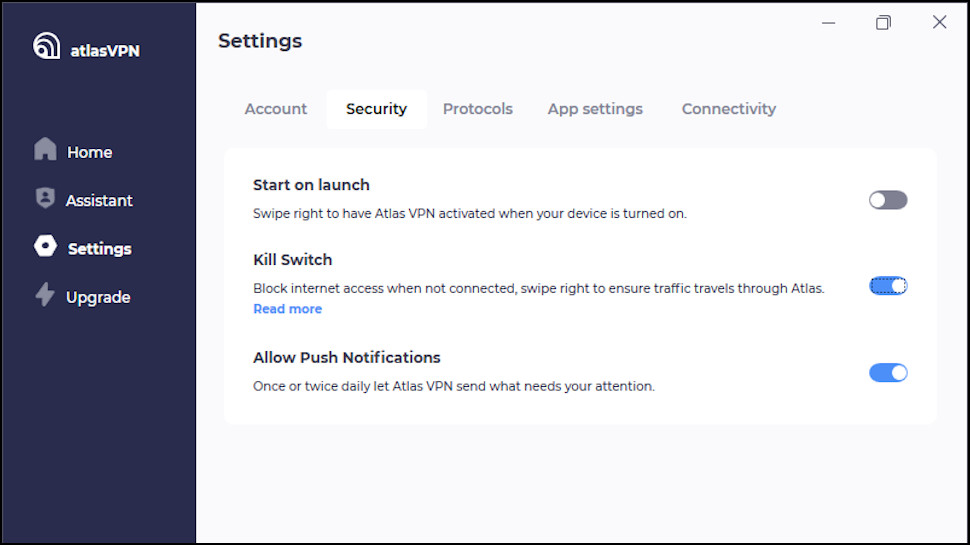
Privacy and logging
Opting for a free VPN shouldn't involve any compromise on privacy, and Atlas VPN's apps deliver on the key technical basics. Strong encryption via the WireGuard and IKEv2/IPSec protocols shield your traffic from snoopers, while private DNS protects your browsing history, and a kill switch aims to keep you safe even if the VPN connection drops.
Our testing found the apps worked as advertised, too. The kill switch had one or two usability issues (see the full Atlas VPN review for details), but correctly blocked our internet traffic whenever the VPN failed. And the apps passed our leak tests, too, with no signs of DNS leaks or other issues.
The company doesn't always treat your privacy as we'd like. Hand over your email address to open an account and it automatically opts you in to receive marketing emails unless you specifically say otherwise, for instance. And the Windows app sends usage details to Atlas VPN unless you turn the feature off. There's no reason to believe the app is sharing anything harmful, but we think providers shouldn't take actions like this unless they have your informed permission.
The Atlas VPN website caught our attention, too, when the Blacklight Privacy Inspector found it contained several web trackers and technologies. (Even Atlas VPN seems concerned: in a previous review, we found its tracker blocker blocked two of the trackers on its own site.)
There is a small plus here in the reassurance of an independent audit, but it's basic, covering the iOS app only. That can't begin to compete with a provider such as TunnelBear, which now has annual audits of its apps, servers and more.
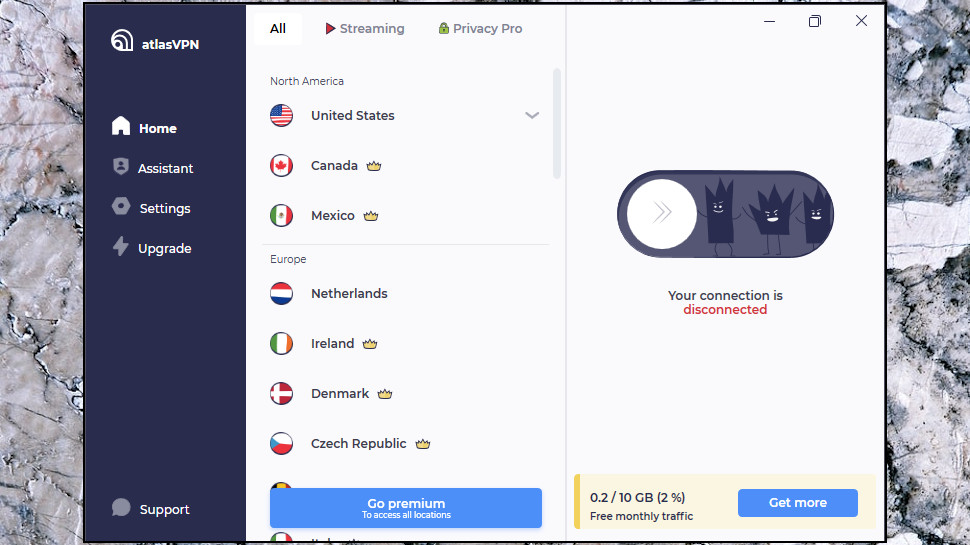
Windows app
Atlas VPN's Windows app looks more cluttered than most, with status information, panels, tabs and menus scattered around the console. It just feels a little more complex than it needs to be.
The Location list has its own usability issues. The free servers aren't displayed at the top of the list, for instance. If you don't know what's available, you might waste time scrolling the full set to find out. And there's no Favorites system to speed up reconnections, either.
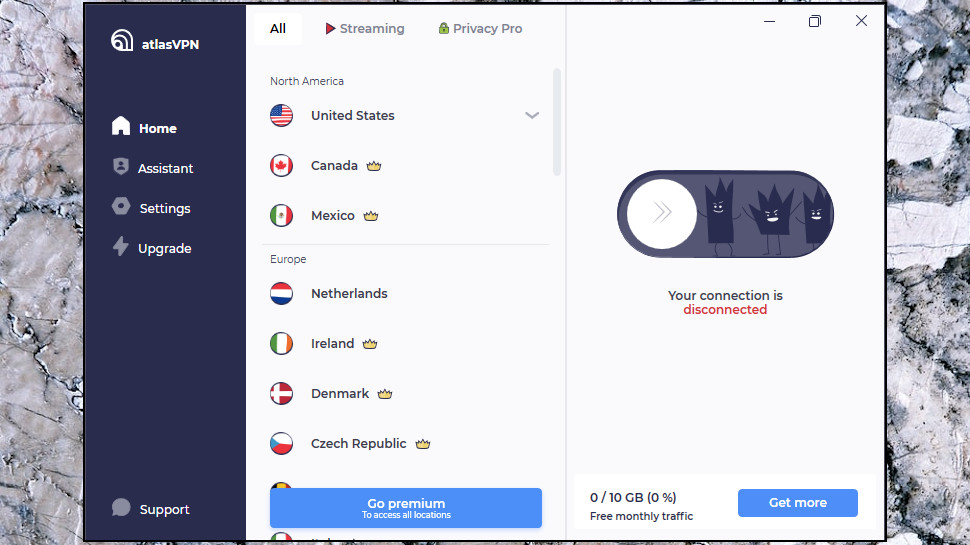
If your VPN needs are simple, that might not matter very much. At a minimum, you can just click Connect to access the nearest Atlas VPN server, Disconnect when you're done, and that's about it. We found this all ran very smoothly, with the app connecting in a couple of seconds, then delivering decent speeds with no connection drops throughout the review.
Experienced users won't be impressed by the app's basics-only feature list. WireGuard support helps deliver good speeds for a free VPN, and the kill switch does a capable job of protecting you if the VPN drops. But as we mentioned above, the paid app's auto-connect feature, tracker blocker and data breach monitor aren't included here. And neither the free or paid Windows apps have split tunneling, stealth support for bypassing VPN blocking, custom DNS settings, protocol tweaks or anything faintly advanced.
Mac app
Atlas VPN's Mac app looks similar to the Windows version, which is good news if you're using both (learn one, then you'll immediately know how to use the other).
There's one odd difference in the location list: unlike the Windows edition, the Mac app sorts alphabetically by continent, with Asia at the top, forcing you to scroll down to access the free servers. It's a very small issue, but would it really have been so difficult for both the Mac and Windows apps to display locations in the same order?
If you're only hitting the Connect button, of course, this won't matter very much. And overall the app performed well for us, connecting quickly and delivering reliable speeds. Factor in the generous 2GB per day data allowance and that's good news.
As with Windows, the feature list doesn't go much beyond the kill switch, IKEv2 and WireGuard protocol support. There is one bonus extra, though, in the shape of Atlas VPN's SafeBrowse, which aims to block malicious websites. That's a surprise, because the Atlas VPN website says SafeBrowse is only available in the paid edition, but hey, we're not complaining.
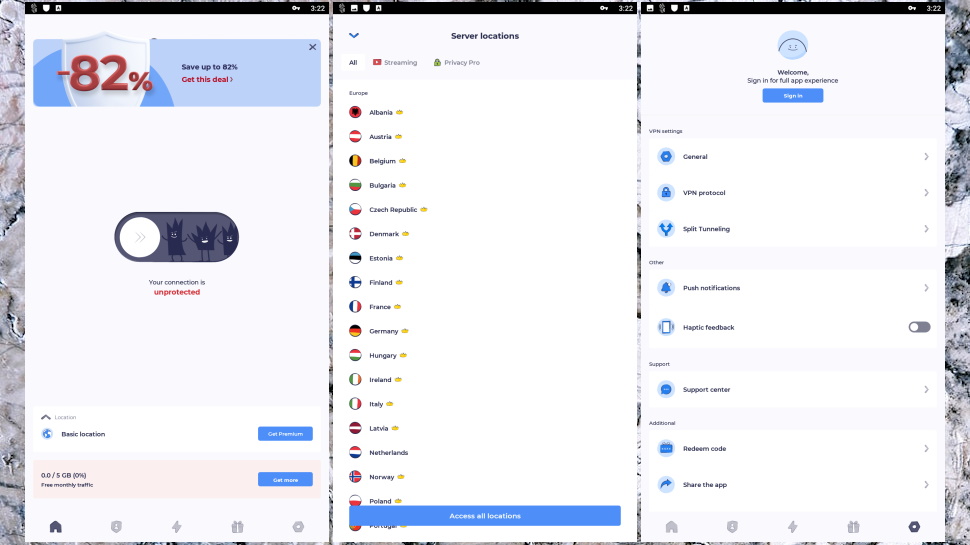
Android and iOS apps
While most providers try to make their mobile apps look and work in much the same way, the Atlas VPN Android and iOS releases are very different.
The Android app has a stripped-back portrait interface, featuring little more than the Connect button and a menu bar. The iOS version's very different landscape design makes much better use of screen space, with the Connect button, locations and other details visible up-front.
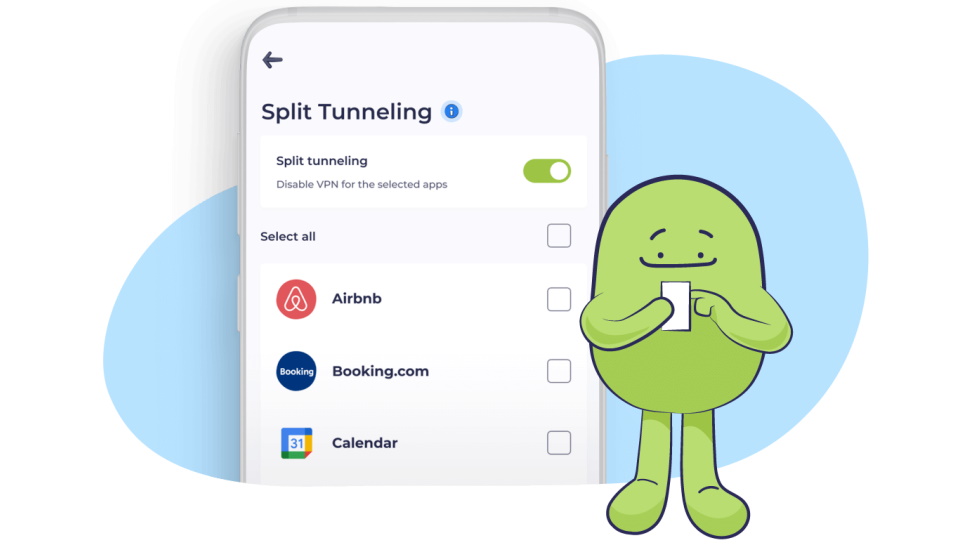
The features here are very similar. As with the desktop, WireGuard and IKEv2 protocol support deliver decent speeds, and a kill switch protects you if the VPN drops. The Android app adds a bonus extra in split tunneling, but there's not much else.
We don't expect much power from a free VPN, though, and what you get works well enough. One tap, and you're quickly online, speeds are decent, plus we had no VPN drops or other issues.
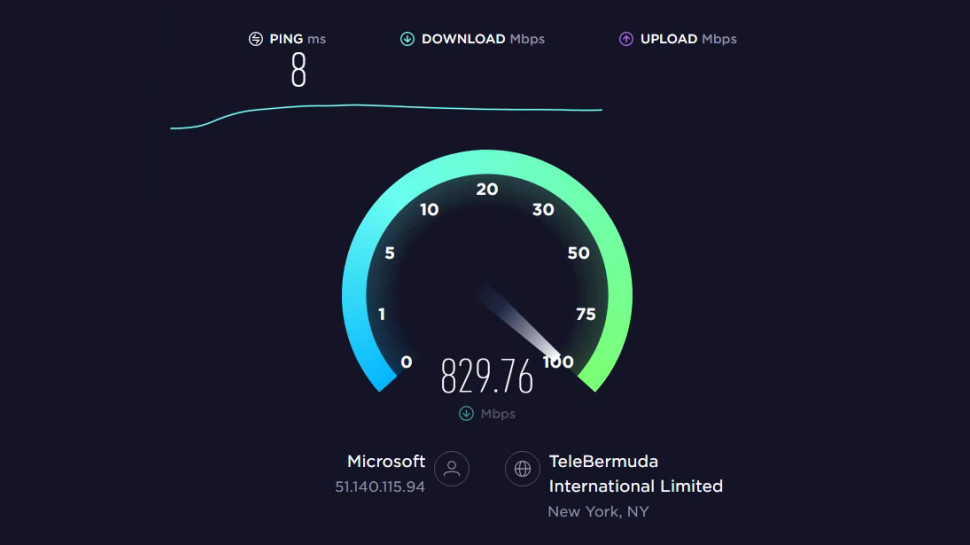
Performance
We weren’t able to run our full VPN performance tests on Atlas VPN Free, as they require far more data than the 10GB monthly allowance. But we still managed to run 10 SpeedTest app checks from a UK data center with a 1Gbps connection, more than enough to see what the service could do.
The results were impressive, with our WireGuard connection hitting a median speed of 320Mbps. That's a little under half what we expect to see with paid VPNs, but it beats most of the free competition. Only PrivadoVPN and Proton VPN scored higher in recent tests.
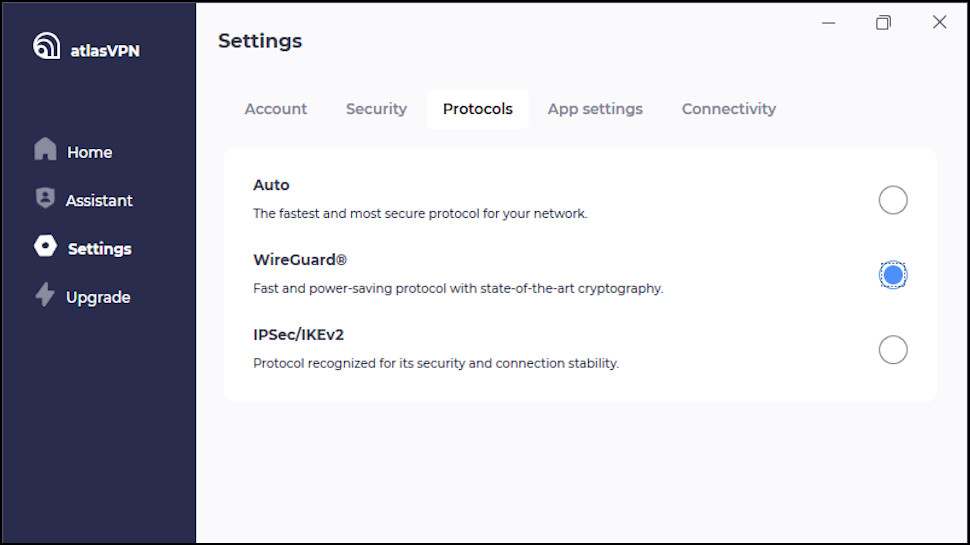
Atlas VPN warns that its free service doesn't have any special support for unblocking streaming sites. Experience tells us that some free VPNs deliver way more than you'd expect in this department, so we ran some tests anyway. And sure enough, there was a surprise: although Atlas VPN Free failed with US Netflix, Amazon Prime and HBO Max, it did unblock Disney Plus.
The company claims its free service supports P2P, but we like to test that, too. And sure enough, it does: we were able to download torrents via the Netherlands, New York and Los Angeles locations.
If you have problems with any of this, Atlas VPN's support team is on hand to help. Although live chat is only available to paying customers, we were able to send a test question via email. That can sometimes mean a lengthy delay, but not here: we received a friendly and genuinely helpful reply just three minutes later. We've waited longer than that for a first live chat response with some of the competition.
Final verdict
Atlas VPN has a mass of small issues – privacy problems, a lack of features, app design – and it doesn't really excel in any area. But none of these problems are critical, and when you look past them, it's a good free VPN at heart: speedy, with 10GB data, P2P and even some unblocking success. Give it a try.
- We've also highlighted the best VPN

Mike is a lead security reviewer at Future, where he stress-tests VPNs, antivirus and more to find out which services are sure to keep you safe, and which are best avoided. Mike began his career as a lead software developer in the engineering world, where his creations were used by big-name companies from Rolls Royce to British Nuclear Fuels and British Aerospace. The early PC viruses caught Mike's attention, and he developed an interest in analyzing malware, and learning the low-level technical details of how Windows and network security work under the hood.
